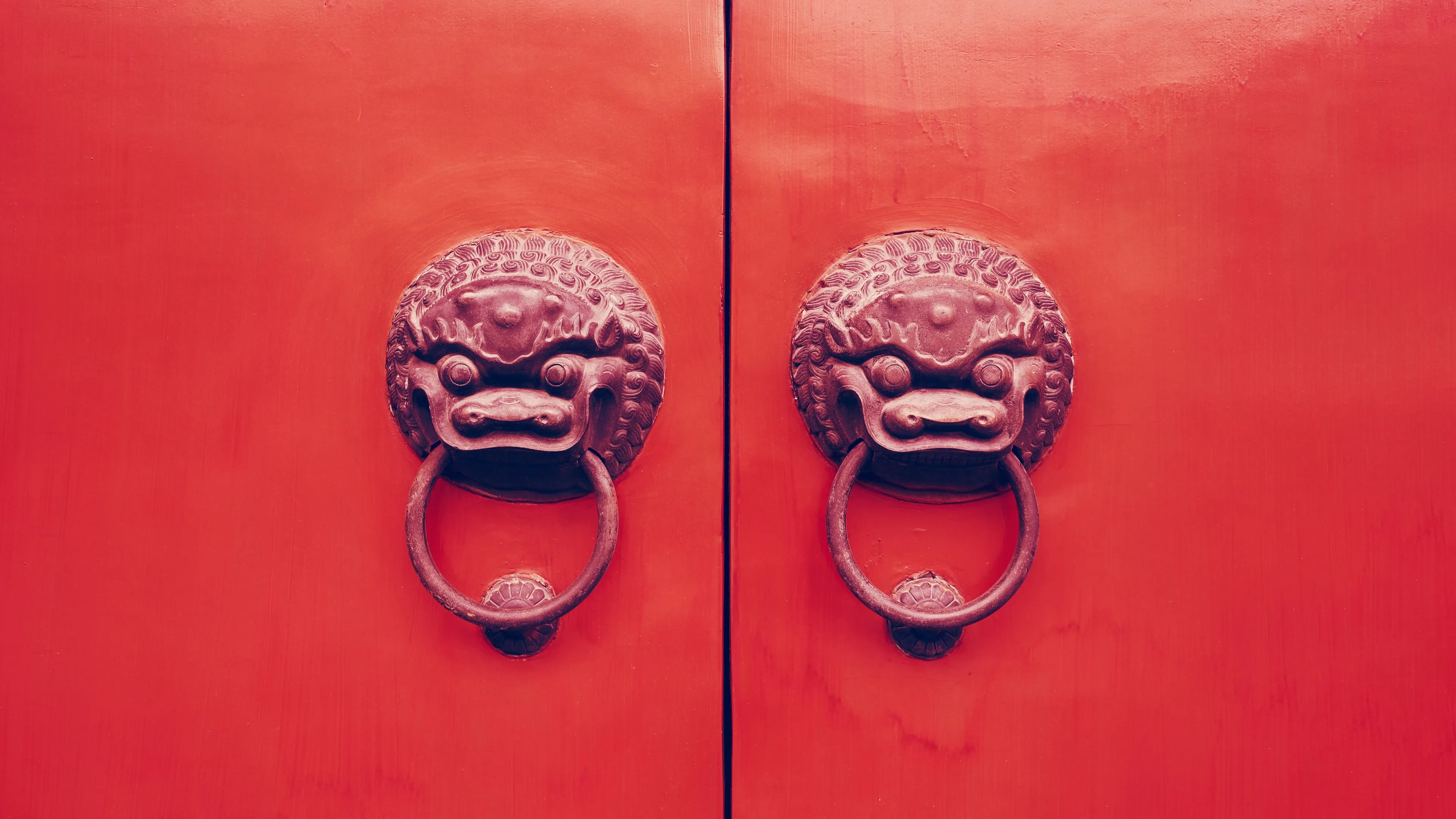The term “red door 开门红” refers to an event with a strong start. The expression fits particularly well with the start of the gregorian calendar year, with President Trump stating (yet again) that the US had reached a “very large and comprehensive” deal with China. At the same time, the People’s Bank of China cut the required reserve ratio by 50 basis points, further lowering the cost of borrowing. Both pieces of news powerfully affected the stock market, and many stocks saw red doors open on day one of 2020.
One other, especially bright, red door is the Shenzhen Stock Exchange’s newly launched Blockchain 50 Index. The index is composed of the top 50 public firms listed on the SZSE that have announced blockchain projects; they’re sorted by average market cap over the past 6 months. From software companies, such as e-commerce, fintech, saas, logistics, and insurance, to hardware companies, such as mining and home appliances, the index represents a hodgepodge of firms that have different core business models, despite being “on the chain 上链.”
Since its debut, the index enjoyed seven days of surges interrupted by only one day of decline. But these surges, are not the result of the firms’ positive, blockchain-charged financial outlooks.
To the contrary, only 5 of the 50 firms have made revenue from blockchain products. The rest are either pivoting to blockchain, such as Hylink, an Internet media firm, or diversifying their existing tech stack, which was the case with Ping An, the largest insurance company in China. Because blockchain is not a core tech of any of the 50 firms, it’s hard to attribute the collective rise to the tech itself.
The launch of SZSE’s Blockchain 50, and its red door start, might be a result of what I think of as the “indexing” of the Chinese tech sector. For years, retail investors here, especially those who are non-tech savvy, look to tech indices to make sense out of the tech world. Many institutions such as exchanges, trading software companies, and funds have launched indexes centered around new technology.
You can find indices that cover 5G providers, AI companies, Chip manufacturers, IoT supplier—dozens of them exist. They’re helpful to small retail investors who want to catch the latest hot sector, but lack the resources to do their own research.
The blockchain index is particularly helpful because “practically no one understands what it is,” a friend who is a retail investor recently told me. “If you go on Chinese stock investment forums, many investors still link blockchain with the central bank digital currency. They have no idea what the real-life use cases are.”
By providing an index, the SZSE gives investors an initial filtering of experimental blockchain firms to select from. (They should still do more research, of course; the index just helps them narrow down the field.)
The index helps to legitimize the blockchain sector and sends a signal to venture investors that future exits are possible. And that of course helps to further invigorate the blockchain startup scene.
That said, the IPO market in China is especially unpredictable; many blockchain firms have chosen to be listed in the US rather than China. For example, OneConnect, Ping An’s fintech and blockchain arm, chose to be listed on Nasdaq, as did Canaan, the first blockchain mining firm.
So even though 开门红 may signal a strong start for a company, where it goes after it passes through the red door is still an uncertain path.
The top 3 other things that happened last week
#1: Alibaba’s Damo Academy lists blockchain as one of the top 10 technology trends
Alibaba’s famed R&D center, the so-called DAMO Academy (Academy for Discovery, Adventure, Momentum and Outlook) just released its annual report on 2020 technology trends and guess what’s hot: “Large-Scale Production-Grade Blockchain Applications.” Not one year after Alibaba predicted that “commercialization of blockchain technology” will gain traction, blockchain related stuff is now the 6th biggest trend in technology.
Being #6 might not sound like a big deal, but blockchain is in good company on the tech list. The other five on the list are AI, Computing, Internet of Things, “Machine Collaboration,” (no idea what that is!) and Chips.
The center is predominantly known for its “Machine Intelligence” research, so blockchain is a bit outside its comfort zone. But the placement of blockchain on the list reflects Alibaba’s increasing focus on the technology (seen from its ever expanding number of blockchain patents ), and its larger role in the tech industry.
Indeed, the 2020 prediction has a sharper focus: Blockchain-as-a-Service (BaaS).
Alibaba is not new to the BaaS competition, a sector that in China includes Tencent’s “TBaaS” and the BaaS platform owned by China’s biggest retailer, JD.com. Alibaba’s BaaS product sits, as one might expect, under its cloud unit, a big focus of Jack Ma as Alibaba diversifies from an e-commerce giant to a tech conglomerate.
Enterprise Software, in particular cloud, has become a battleground. Alibaba’s Cloud unit doesn’t disappoint either. It has controlled almost half of the public cloud market as foreign cloud providers such as Amazon fade away. As blockchain becomes the new, cool feature in the cloud market, it’s no wonder that Alibaba is seizing the opportunity and ranking BaaS a hot trend—or maybe it’s just a self-fulfilling prophecy.
#2. New password law becomes effective: National security is everyone’s job.
China’s password law, which passed on Oct 26th, finally took effect last week. And right away, on January 1, Guangdong, a coastal province in South China, launched a “preaching convention” where cryptography experts and hundreds of civil servants fervently studied, discussed, and advocated the newly-enacted law as if it were gospel.
The law is composed of 12 mandates that govern Internet security, and creates categories for passwords (“common,” “core” and “commercial.”) The law is a bit vague about the precise definitions of each type of password, which might be by design.
One of the overarching points of the law is that passwords that might protect information deemed important to “national security” are not private. Instead they are “governed by the Party,” meaning if the Government wants the password, you better be willing to hand it over.
What constitutes “national security?” That’s not spelled out, either. It’s implied that because we don't know what's national security, we should treat all information as national security. Hence, a good citizen ought to provide the Government with any password it demands.
The law could have been quietly enacted. However, Guangdong decided to make a big deal out of it.
Why? Each of China’s most commercial provinces is having a little identity crisis as the country wholeheartedly embraces blockchain. Hainan has latched onto the idea of becoming “blockchain island.” Guizhou is the data center. What's left for Guangdong?
The manufacturing-intensive province, which is close to Hong Kong, calls itself the “world's factory.” It’s been struggling to find its tech edge—until recently, when it announced a new digital identity project, the so-called “ trusted digital identity cryptography blockchain project ( 可信数字身份密码区块链).” The project covers digital-identity management, cryptography, digital government and even blockchain-based cloud services.
The combination of the password law, with its emphasis on security, and digital identity, looks like a perfect match for Guangdong, the new “password province.”
#3: Can blockchain disrupt Gaokao?
Minhong ( Michael ) Yu is the legendary founder and chairman of New Oriental Education and Technology Group in Beijing. Many students (including your humble correspondent) have taken New Oriental’s language classes before studying abroad.
Hailed as the godfather of overseas study, Yu also has a passion for edtech (as evidenced by the group’s name.) In a recent venture competition, Yu proposed using blockchain to record students’ grades throughout middle school and high school as a way for colleges to evaluate prospective admissions. The big idea: base acceptance on longitudinal academic performance, rather than China’s notorious Gaokao, a 2-day college-entrance exam.
It’s a far-fetched dream that does not need blockchain. Yet by using blockchain as a sugar coating, the disruptive nature of Yu’s proposal seems more mellow—and possibly more acceptable to policy-makers these days.
Do you know?
“Bomb explosion” ( 爆雷) is a slang term used to describe the sudden revelation of a scam project—typically, when the founder runs away with a large amount of investor funds. The term originated with P2P lending firms in 2018, when more than 50 of these companies were reported to have shut down. The expression now refers to businesses that have dirty secrets, and the potential to “explode.” The term is particularly popular among crypto folks as stepping on a bomb (踩雷) has caused many explosions, and lots of damage.
[ Da Bing is a weekly round-up of the most important crypto-related news that happened in China last week.]

